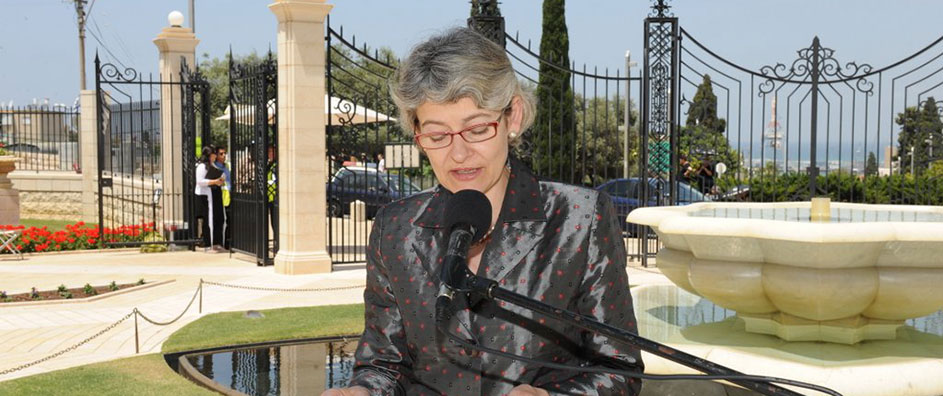The Bahá’í teachings emphasize the fundamental importance of tolerance and peace, concepts that are intricately woven into the fabric of the faith’s philosophy and its aspirations for global unity. A recent landmark event in Haifa underscored these ideals as the UNESCO Chief officially inaugurated the Tolerance and Peace Square. This occasion serves as a poignant reminder of the pressing need for harmonious coexistence in today’s fragmented world.
The Tolerance and Peace Square is not merely a geographical location; it embodies a vision for a future characterized by mutual respect and understanding among diverse cultures and religions. The Bahá’í writings instruct followers to regard all humanity as one family, thereby fostering a sense of collective identity. Instances such as the inauguration of this square illuminate how such ideals can manifest in physical forms—spaces that celebrate diversity while promoting discourse that transcends differences.
By situating the Tolerance and Peace Square in Haifa, the Bahá’í World Centre enhances its status as a global beacon of peace. Haifa itself is a city renowned for its multicultural fabric, where people of various backgrounds coexist. The physical manifestation of oneness in such a location encourages visitors and residents alike to reflect on the significance of tolerance. The square’s design is emblematic of a collaborative effort, drawing upon the artistic and architectural influences of myriad cultures. It inspires contemplation and dialogue about the values of love and altruism that Bahá’í teachings uphold.
This inauguration was attended by dignitaries, community leaders, and individuals from various walks of life, symbolizing a collective commitment to the ideals of peace and tolerance. Statements made during the ceremony highlighted the essential role of education in nurturing these values within societies, a cornerstone of Bahá’í philosophy. The power of education to dismantle prejudice and promote understanding is a theme that resonated throughout the event. By raising awareness of Bahá’í principles in mainstream discourses, the teachings advocate for an informed citizenry that can contribute to shared aspirations for peace.
Attendees engaged in meaningful dialogues, sharing their experiences and perspectives on tolerance in their respective communities. Such exchanges are vital for building bridges across cultural divides. Anecdotes from various segments of society, whether from the arts, sciences, or civic leaders, showcased the multiplicity of ways individuals and groups are working towards fostering peace. In the context of a world increasingly plagued by polarization, these narratives serve as a source of inspiration for others to emulate.
The event also highlighted the importance of art as a medium for expressing and promoting tolerance. Art has a unique ability to convey profound truths and bridge divides that words alone may struggle to traverse. The square itself features artistic installations that reflect diverse cultural heritages, encouraging visitors to ponder their meanings and significance. Such creativity serves as a catalyst for dialogue, allowing individuals to connect with one another through shared experiences and emotions, thereby reinforcing the tenets of tolerance.
In conjunction with the inauguration ceremony, workshops and discussions were organized, aiming to equip participants with the tools necessary for promoting peace in their local contexts. These workshops delved into the practical applications of Bahá’í principles, encouraging attendees to initiate grassroots movements that can lead to meaningful societal change. Topics explored ranged from conflict resolution techniques to the facilitation of interfaith dialogues, all designed to empower individuals to become agents of change in their communities.
The ongoing relevance of these teachings is particularly pronounced in our contemporary milieu, replete with challenges that test the resilience of social cohesion. Global conflicts, sectarian strife, and the rise of xenophobia underscore the urgency of embracing principles rooted in tolerance. The Bahá’í teachings offer a framework through which these pervasive issues can be addressed. They advocate for the development of a strong moral foundation that promotes empathy and compassion as antidotes to the increasing disunion that characterizes modern life.
The Tolerance and Peace Square stands as a call to action. It invites the global community to participate in a collective endeavor to alleviate the burdens of prejudice and discord. Initiatives rooted in Bahá’í philosophy can inspire movements that extend past the boundaries of religion, fostering partnerships among races, nations, and cultures. In this respect, the square is more than a physical space; it is a commitment to the realization of a shared destiny.
Looking ahead, the continued dialogue initiated by the inauguration of the Tolerance and Peace Square will likely inspire further initiatives aimed at global harmony. Educational campaigns and community-building activities can take root and flourish, driven by the ethos of unity. The Bahá’í community has a vital role to play in steering discourse towards inclusivity, helping various groups navigate their differences while embracing their shared humanity.
In conclusion, the inauguration of the Tolerance and Peace Square serves as an exemplary testament to the Bahá’í commitment to fostering a world of tranquility through the principles of tolerance and unity. It stands as an invitation for all to reflect on their responsibilities in contributing to a peaceful world, reminding us that the path to peace is a collaborative journey that requires unwavering dedication and collective action. As such, it is a monumental step in the ongoing quest for global understanding and harmony among diverse peoples.
